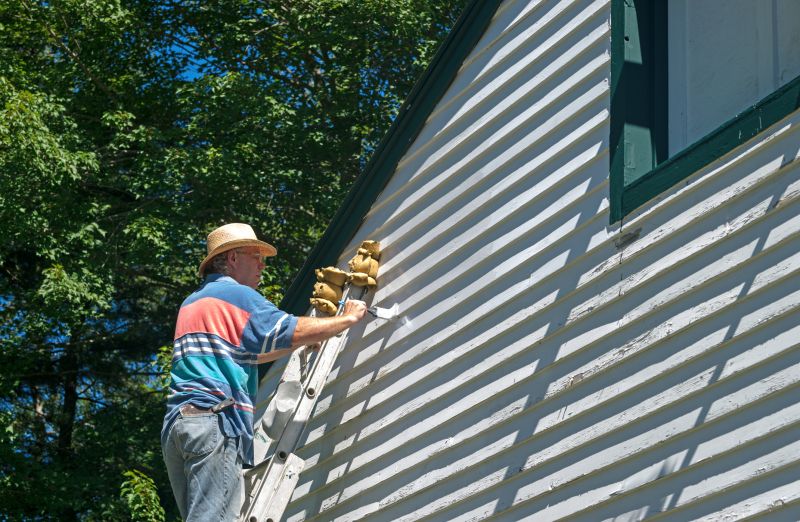Favorite Siding Service Supplies for Reliable and Efficient Work
Identify the most reliable tools and materials that ensure durability and efficiency in every siding project.
 When undertaking siding services in Louisville, OH, selecting the right products is essential for achieving durable and visually appealing results. The market offers a wide array of options, each suited to different needs, budgets, and aesthetic preferences. From traditional materials like vinyl and wood to modern composite and fiber cement options, homeowners and contractors can find products that align with their project requirements. Proper product selection not only enhances the appearance of a building but also provides protection against the elements, ensuring longevity and reduced maintenance over time.
When undertaking siding services in Louisville, OH, selecting the right products is essential for achieving durable and visually appealing results. The market offers a wide array of options, each suited to different needs, budgets, and aesthetic preferences. From traditional materials like vinyl and wood to modern composite and fiber cement options, homeowners and contractors can find products that align with their project requirements. Proper product selection not only enhances the appearance of a building but also provides protection against the elements, ensuring longevity and reduced maintenance over time.
Top Overall Option
Vinyl Siding Panels
Vinyl siding panels are a popular choice for their versatility, ease of installation, and low maintenance. They come in a wide range of colors and textures, allowing for customization to match various architectural styles. Vinyl panels are resistant to moisture, pests, and fading, making them suitable for diverse climates. When properly selected and installed, they can provide a durable exterior finish that requires minimal upkeep over the years.
Types of Products For Siding Service
Vinyl Siding
A widely used material known for its affordability and low maintenance, available in many styles and colors.
Fiber Cement Siding
A composite material offering durability and resistance to pests and weather, suitable for various architectural designs.
Wood Siding
Provides a natural look with options like shingles, lap siding, or board and batten, requiring regular maintenance.
Aluminum Siding
Lightweight and resistant to rust, aluminum siding is often chosen for its ease of installation and longevity.
Engineered Wood Siding
Manufactured to mimic natural wood with added resistance to insects and rot, offering a balance of aesthetics and durability.
Stucco
A textured exterior finish that offers a unique appearance and weather resistance, often used in Mediterranean-style architecture.
Brick Veneer Siding
Provides the classic look of brick with lighter weight and easier installation, suitable for accent walls or full facades.
Stone Veneer
Offers a natural stone appearance, adding texture and visual interest to exterior surfaces.
Composite Siding
Made from a blend of materials, providing a versatile and often cost-effective alternative to traditional siding types.
PVC Siding
A type of plastic siding that is resistant to moisture and pests, often used for its affordability and ease of maintenance.
Metal Siding
Includes options like steel or zinc, known for their strength, fire resistance, and modern aesthetic.
Insulated Siding
Features a foam core for improved energy efficiency, enhancing insulation while providing exterior protection.
Popular Choices
A common choice for many homeowners due to its affordability and variety of styles.
Favored for its durability and low maintenance requirements.
Popular for its natural appearance and traditional charm.
Chosen for its lightweight nature and resistance to rust.
Selected for its combination of aesthetics and durability.
Often used for its textured finish and weather resistance.
Provides a classic look with easier installation compared to full brick.
Adds natural texture and visual interest to exteriors.
Versatile and often cost-effective, suitable for various styles.
Known for its resistance to moisture and pests.
Offers strength and a contemporary appearance.
Enhances energy efficiency while providing exterior protection.
In addition to the primary siding materials, a variety of accessories and installation tools are available to facilitate a smooth and efficient siding process. Quality adhesives, fasteners, and sealants can significantly influence the overall outcome, preventing issues such as warping, cracking, or water infiltration. It's important to consider the specific conditions of the Louisville climate, including humidity and temperature fluctuations, when choosing siding products. Proper installation practices combined with high-quality products contribute to the structural integrity and aesthetic appeal of the finished project.
Understanding the different types of siding products and their applications can help homeowners and professionals make informed decisions. Whether updating an existing facade or constructing a new building, selecting the appropriate products ensures that the siding will perform well over time. Consulting with local suppliers and experts familiar with the Louisville area can provide additional insights into the best options suited for local weather conditions and architectural styles. Ultimately, investing in the right siding products enhances curb appeal, provides weather resistance, and supports the long-term value of the property.
Key Buying Considerations
- Climate suitability: Choose products designed to withstand Louisville’s weather conditions.
- Material durability: Consider the longevity and resistance to pests, rot, and moisture.
- Maintenance requirements: Evaluate how much upkeep is needed over time.
- Aesthetic preferences: Select finishes and textures that complement your home’s style.
- Installation complexity: Determine whether professional installation is needed or if DIY is feasible.
- Budget constraints: Balance cost with quality and expected lifespan.
- Energy efficiency: Look for products with insulating properties if energy savings are a priority.
- Warranty coverage: Check for manufacturer warranties that protect your investment.
- Fire resistance: Consider materials with fire-resistant properties for added safety.
- Environmental conditions: Be mindful of exposure to sun, rain, snow, and temperature fluctuations.
- Compatibility with existing structures: Ensure new siding integrates well with current architecture.
- Availability of accessories: Confirm that matching trim, fasteners, and sealants are accessible.
- Local building codes: Verify compliance with Louisville and Ohio regulations.
- Resale value impact: Consider how siding choices could influence property value.
